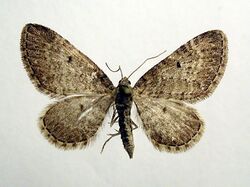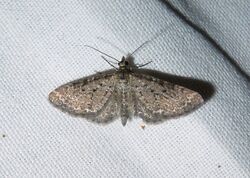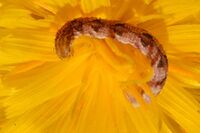Biology:Eupithecia satyrata
| Eupithecia satyrata | |
|---|---|

| |

| |
| Scientific classification | |
| Domain: | Eukaryota |
| Kingdom: | Animalia |
| Phylum: | Arthropoda |
| Class: | Insecta |
| Order: | Lepidoptera |
| Family: | Geometridae |
| Genus: | Eupithecia |
| Species: | E. satyrata
|
| Binomial name | |
| Eupithecia satyrata (Hübner, 1813)[1]
| |
| Synonyms[3] | |
| |
Eupithecia satyrata, the satyr pug, is a species of moth of the family Geometridae. It was described by Jacob Hübner in 1813. It is found from Ireland, through northern and central Europe (from Scandinavia to the northern Mediterranean) east to all of Russia and central Asia and western Siberia to Tibet. It is also present in North Africa and North America.
The wingspan is 18–24 millimetres (0.71–0.94 in). Eupithecia satyrata is variable in pattern. The ground colour of the wings is ash, grey or brownish. The veins often have a black with white dusting. There are paler crosslines. On the forewings a very indistinct terminal fascia ends in a tiny tornal spot. There is a fine discal spot on the forewing. This is absent on the hindwing.[4][5][6] Prout gives an account of the variations.[7]
Adults are on wing from March to September. There is one generation per year.
The larvae feed on the flowers of a wide range of plants including Achillea, Scabiosa, Solidago, Senecio and Erica tetralix.
Subspecies
- Eupithecia satyrata satyrata
- Eupithecia satyrata callunaria Doubleday, 1850
- Eupithecia satyrata curzoni Gregson, 1884
- Eupithecia satyrata dodata Taylor, 1906
- Eupithecia satyrata intimata Pearsall, 1908
- Eupithecia satyrata juldusi Dietze, 1910
- Eupithecia satyrata rivosulata Dietze, 1875 (Yakutia, Siberia)
- Eupithecia satyrata subatrata Staudinger, 1871
- Eupithecia satyrata zermattensis Wehrli, 1928
Similar species
- Eupithecia intricata
References
- ↑ Yu, Dicky Sick Ki. "Eupithecia satyrata (Hubner 1813)". Taxapad. http://www.taxapad.com/local.php?taxonidLC=82856762.
- ↑ Mironov, Vladimir; Galsworthy, Anthony (5 March 2014). "A survey of Eupithecia Curtis, 1825 (Lepidoptera, Geometridae, Larentiinae) in Mongolia with descriptions of two new species". Zootaxa 3774 (2). doi:10.11646/zootaxa.3774.2.1. https://www.mapress.com/zootaxa/2014/f/z03774p130f.pdf.
- ↑ Mironov, Vladimir; Galsworthy, Sir Anthony Charles (1 November 2013) (in en). The Eupithecia of China: A Revision. BRILL. pp. 384–387. ISBN 978-90-04-25453-4. https://brill.com/display/title/24316. Retrieved 15 January 2023.
- ↑ Waring, P. & Townsend, M, 2003, Field Guide to the Moths of Great Britain and Ireland British Wildlife Publishing ISBN:9781472964519
- ↑ Skinner, B, 1998, The Colour Identification Guide to Moths of the British Isles , Viking Press, ISBN:9780670879786
- ↑ Riley, A.M. & Prior, G., 2003, British and Irish pug moths Harley Books, ISBN:0-946589-51-8
- ↑ Prout, L. B. (1912–16). Geometridae. In A. Seitz (ed.) The Macrolepidoptera of the World. The Palaearctic Geometridae, 4. 479 pp. Alfred Kernen, Stuttgart.pdf *
 This article incorporates text from this source, which is in the public domain.
This article incorporates text from this source, which is in the public domain.
External links
| Wikimedia Commons has media related to Eupithecia satyrata. |
- Kimber, Ian. "70.177 BF1828 Satyr Pug Eupithecia satyrata (Hübner, [1813)"]. https://ukmoths.org.uk/species/eupithecia-satyrata/.
- Butterflies and Moths of Northern Ireland
- Lepiforum e.V.
Wikidata ☰ Q1314877 entry
 |


